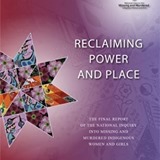 Calls for Justice: (First two paragraphs repeated from 11a.)
Calls for Justice: (First two paragraphs repeated from 11a.)
“As the evidence demonstrates, human rights and Indigenous rights abuses committed and condoned by the Canadian state represent genocide against Indigenous women, girls, and 2SLGBTQQIA people. These abuses and violations have resulted in the denial of safety, security, and human dignity. They are the root causes of violence… which Indigenous people are forced to confront on a daily basis and where perpetrators act with impunity.” (p.167)
“The steps to end and redress this genocide must be no less monumental that the combination of systems and actions that has worked to maintain colonial violence for generations. A permanent commitment to ending this genocide requires addressing the four pathways explored within this report, namely:
- historical, multigenerational, and intergenerational trauma;
- social and economic marginalization;
- maintaining the status quo and institutional lack of will; and
- ignoring the agency and expertise of Indigenous women, girls, and 2SLGBTQQIA people.
This is the essence of the Final Report. The following “Calls for Justice” are legal imperatives based on international and domestic human and Indigenous rights laws. They aren’t just about institutions or governments; there is a role for everyone.
Principles for Change: A fundamental premise of the substantive equality approach is that Indigenous women and girls should not be treated solely as victims but as independent rights holders. … Exposure to violence is then seen as a systematic denial of rights. … This approach would reaffirm Canada’s commitment to uphold and to promote the human rights of people in vulnerable circumstances.
- Substantive equality is a legal principle that refers to the achievement of true equality in outcomes. None of the issues addressed should be considered in isolation; all are key to upholding rights and creating safety.
- A decolonizing approach aims to undo the forces of colonialism and to re-establish Indigenous Nationhood. It is strength based, focusing on resilience and expertise.
- Inclusion of Families and Survivors must be part of the implementation, including all forms of familial kinship.
- Self-Determined and Indigenous-Led Solutions and Services are based on the United Nations Declaration on the Right of Indigenous Peoples.
- Recognizing Distinctions includes self-identification (First Nation, Inuit, Metis) geographical information , residency (on/off reserve, rural/urban) and a gendered lens that understands differences and diversity.
- Cultural Safety requires the inclusion of Indigenous languages, laws and protocols, governance, spirituality, and religion.
- Trauma-Informed Approach incorporated knowledge of trauma into all positions, procedures, and practices.
Overarching Findings are that many truths are connected and inseparable. These include:
- The significant, persistent, and deliberate pattern of systemic racial and gendered human rights violations… is the cause of the disappearances, murders, and violence experiences by Indigenous women, girls, and 2SLGBTQQIA people, and is genocide. An absolute paradigm shift is required.
- Canada signed and ratified many international declarations and treaties – and failed to meaningfully implement them.
- The Canadian state has displaced Indigenous women and 2SLGBTQQIA people from their traditional roles in governance and leadership and continues to violate their political rights.
- Self-determination and self-governance are recognized as fundamental Indigenous and human rights and a best practice.
The 231 comprehensive Calls for Justice (p.176 – 199) are channeled into three categories with specific calls for Inuit, Metis, and 2SLGBTQQIA.
(1) All Governments:
-
-
- Human and Indigenous Rights and Governmental Obligations – 11 calls
- Culture – 7 calls
- Health and Wellness – 7 calls
- Human Security – 8 calls
- Justice – 25 calls
-
(2) Industries, Institutions, Services, and Partnerships:
-
-
- Media and Social Influencers – 1 call with 4 parts
- Health and Wellness Service Providers – 9 calls
- Transportation Service Providers and the Hospitality Industry – 1 call
- Police Services – 11 calls
- Attorneys and Law Societies – 1 call with 3 parts
- Educators – 2 calls
- Social Workers and Those Implicated in Child Welfare – 15 calls
- Extractive and Development Industries – 5 calls
- Correctional Services Canada – 13 calls
-
(3) Calls for All Canadians – 8 calls
(4) Intuit-Specific Calls for Justice – 46 calls
(5) Metis-Specific Calls for Justice – 29 calls
(6) 2SLGBTQQIA-Specific Calls for Justice -32 calls
Personal Note: All Canadians are called to speak out against violence, learn the true history of Canada, read the Final Report, actively work to break down barriers, speak out against racism and sexism, promote the safety of women and girls, create relationships based on respect and help hold governments accountable. This much I can do. My work of several blogs over several months has been to help summarize the Final Report for those not able to read its entirety. Unfortunately, 2020 has been shadowed by the Corona virus. Although it may be a while again before we can fully respond to Calls for Justice, we must persevere.

